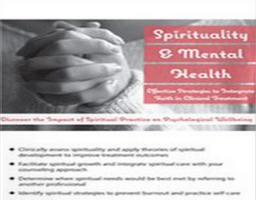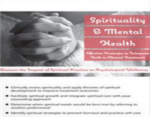Historically, there has been a rift between psychology and religion, but as helping professionals we need to recognize the significant contribution of religion and spirituality to an individual’s overall wellbeing.
Esther W Williams – Spirituality & Mental Health
Integrating Spirituality in Client Care
Defining spirituality and religion
Benefits of including spirituality in therapy
Important factors of physical and mental health
Faith
Spirituality
Meditation
Prayer
Mindfulness
Nonreligious or nonspiritual clients
Utilize nature/Green Therapy
Incorporate research-based forgiveness and gratitude practices
Enhance spiritual harmony for LGBT clients
Know when and to whom to refer
Christian counseling
Pastoral counseling
Spiritual direction
Spiritual Development and Assessing Spiritual/Religious identity:
Fowler’s theory of Faith Development
Kohlberg’s levels of Moral Development
Examine a client’s spiritual/religious journey and its role in treatment
Discerning between life-giving vs. life-draining practices
Appreciate the contributions of various faith traditions
Hinduism
Daoism
Buddhism
Judaism
Christianity
Others
Lessons from teachers of the great world faith traditions
Buddha
Jesus
Mohammed
And others
Integrate Spiritual Care With Your Counseling Approach
Cognitive-Behavioral
Humanistic
Interpersonal Psychotherapy
Experientially Focused
Jungian
The Twelve Step Program
Practicing Self-care for the Therapist
Find your spiritual and ethical core
Discover and connect with your True Self
Spiritual practices to prevent burnout
Would you like to receive Esther W Williams – Spirituality & Mental Health ?
Description:
Historically, there has been a rift between psychology and religion, but as helping professionals we need to recognize the significant contribution of religion and spirituality to an individual’s overall wellbeing. There are numerous studies providing empirical evidence suggesting a strong link between a person’s spiritual and religious beliefs and their physical and mental health. If a client is receptive, spirituality can be identified as a resource to complement psychological interventions which enhance coping during times of losses, conflicts, disappointments, and health issues.
It is often in situations of strain and tension that the greatest relevance of religion may be found. As therapists, we must be respectful of all faith traditions and our client’s personal spiritual beliefs, while also creating a safe place for our clients to preserve, evaluate, question, and revise their beliefs.
This seminar explores the impact of spirituality and faith on wellbeing, insight into the major spiritual traditions and Great World Religions, and ways to integrate spirituality into your personal counseling orientation. Attendees will discover the power of combining faith, nature, meditation, mindfulness, and prayer into the therapeutic process for improved treatment plans and outcomes.








